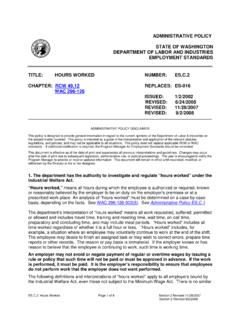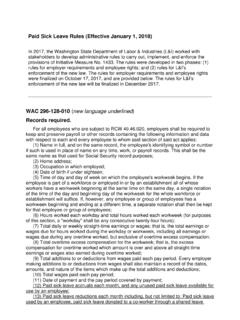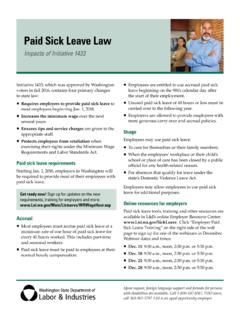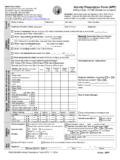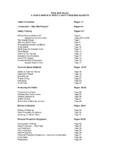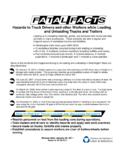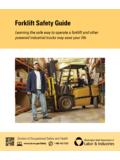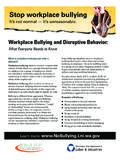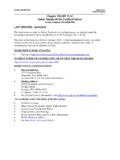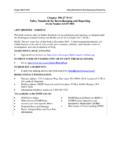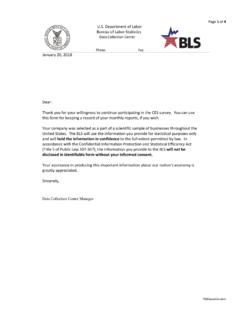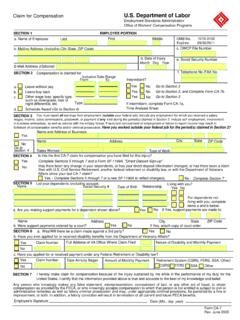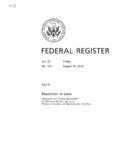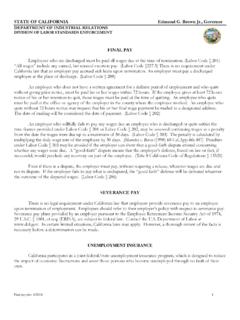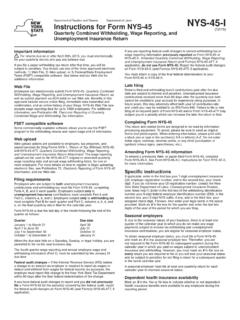Transcription of ADMINISTRATIVE POLICY STATE OF WASHINGTON …
1 meal and rest periods Page 1 of 6 12/1/2017 ADMINISTRATIVE POLICY STATE OF WASHINGTON department OF labor AND INDUSTRIES EMPLOYMENT STANDARDS TITLE: meal and rest periods NUMBER: FOR NONAGRICULTURAL WORKERS AGE 18 AND OVER CHAPTER: RCW ISSUED: 1/2/2002 WAC 296-126-092 REVISED: 6/24/2005 REVISED: 12/1/2017 ADMINISTRATIVE POLICY DISCLAIMER This POLICY is designed to provide general information in regard to the current opinions of the department of labor & Industries on the subject matter covered. This POLICY is intended as a guide in the interpretation and application of the relevant statutes, regulations, and policies, and may not be applicable to all situations. This POLICY does not replace applicable RCW or WAC standards.
2 If additional clarification is required, the Program Manager for Employment Standards should be consulted. This document is effective as of the date of print and supersedes all previous interpretations and guidelines. Changes may occur after the date of print due to subsequent legislation, ADMINISTRATIVE rule, or judicial proceedings. The user is encouraged to notify the Program Manager to provide or receive updated information. This document will remain in effect until rescinded, modified, or withdrawn by the Director or his or her designee. 1. Are meal and rest periods conditions of labor that may be regulated by the department under RCW , the Industrial Welfare Act? Yes, the department has the specific authority to make rules governing conditions of labor , and all employees subject to the Industrial Welfare Act (IWA) are entitled to the protections of the rules on meal and rest breaks.
3 The actual meal and rest break requirements are not in the statute but appear in WAC 296-126-092, Standards of labor . Note: Minor employees (under 18) and agricultural workers are not covered by these rules. The regulations for minors are found in WAC 296-125-0285 and WAC 296-125-0287. The regulations for agricultural employees are found in WAC 296-131-020. 2. Are both private and public employees covered by these meal and rest period regulations? Yes. The IWA and related rules establish a minimum standard for working conditions for all covered employees working for both public sector and private sector businesses in the STATE , including non-profit organizations that employ workers. 3. Does a collective bargaining agreement (CBA) or a labor /management agreement allow public employers to give meal and rest periods different from those under WAC 296-126-092?
4 meal and rest periods Page 2 of 6 12/1/2017 Yes. Effective May 20, 2003, the legislature amended RCW to include the STATE , any STATE institution, STATE agency, political subdivisions of the STATE , and any municipal corporation or quasi-municipal corporation . Thus it brought public employees under the protections of the IWA, including the meal and rest period regulations, WAC 296-126-092. See ADMINISTRATIVE POLICY Industrial Welfare Act and Collective Bargaining Agreements. Exceptions--The meal and rest periods under WAC 296-126-092 do not apply to: Public employers with a local resolution, ordinance, or rule in effect prior to April 1, 2003 that has provisions for meal and rest periods different from those under WAC 296-126-092, or Employees of public employers who have entered into collective bargaining contracts, labor /management agreements, or other mutually agreed to employment agreements that specifically vary from or supersede, in part or in total, the rules regarding meal and rest periods , or Public employers with collective bargaining agreements (CBA) in effect prior to April 1, 2003 that provide for meal and rest periods different from the requirements of WAC 296-126-092.
5 The public employer may continue to follow the CBA until its expiration. Subsequent collective bargaining agreements may provide for meal and rest periods that are specifically different, in whole or in part, from the requirements under WAC 296-126-092. If public employers do not meet one of the above exceptions, then public employees are included in the requirements for meal and rest periods under WAC 296-126-092. 4. May a collective bargaining agreement have different provisions for meal and rest periods for employees in construction trades? Yes. Effective May 20, 2003, RCW was amended to include a provision that the rules regarding appropriate meal and rest periods (WAC 296-126-092) for employees in the construction trades, , laborers, carpenters, sheet metal, ironworkers, etc., may be superseded by a CBA negotiated under the National labor Relations Act.
6 The terms of the CBA covering such employees must specifically require rest and meal periods and set forth the conditions for the rest and meal periods . However, the conditions for meal and rest periods can vary from the requirements of WAC 296-126-092. Construction trades may include, but are not necessarily limited to, employees working in construction, alteration, or repair of any type of privately, commercially, or publicly-owned building, road, or parking lot, or erecting playground or school yard equipment, or other related industries where the employees are in a recognized construction trade covered by a CBA. This exception does not apply to employees of construction companies without a CBA. 5. When is a meal period required? Meal period requirements are triggered by more than five hours of work: Employees working five consecutive hours or less need not be allowed a meal period.
7 Employees working over five hours shall be allowed a meal period. See WAC 296-126-092(1). meal and rest periods Page 3 of 6 12/1/2017 The 30-minute meal period must be provided between the second and fifth working hour. The provision in WAC 296-126-092(4) that no employee shall be required to work more than five consecutive hours without a meal period applies to the employee s normal workday. For example, an employee who normally works a 12-hour shift shall be allowed to take a 30-minute meal period no later than at the end of each five hours worked. Employees working at least three hours longer than a normal workday shall be allowed a meal period before or during the overtime portion of the shift. A "normal work day" is the shift the employee is regularly scheduled to work. If the employee s scheduled shift is changed by working a double shift, or working extra hours, the additional meal period may be required.
8 Employees working a regular 12-hour shift who work 3 hours or more after the regular shift will be entitled to a meal period and possibly to additional meal periods depending upon the number of hours to be worked. See WAC 296-126-092(3). The second 30-minute meal period must be given within five hours from the end of the first meal period and for each five hours worked thereafter. 6. When may meal periods be unpaid? Meal periods are not considered hours of work and may always be unpaid as long as employees are completely relieved from duty and receive 30 minutes of uninterrupted mealtime. It is not necessary that an employee be permitted to leave the premises if he/she is otherwise completely free from duties during the meal period. In such a case, payment of the meal period is not required; however, employees must be completely relieved from duty and free to spend their meal period on the premises as they please.
9 These situations must be evaluated on a case-by-case basis to determine if the employee is on the premises in the in the interest of the employer. If so, the employee is on duty during the meal period and must be paid. Employees who remain on the premises during their meal period on their own initiative and are completely free from duty are not required to be paid when they keep their pager, cell phone, or radio on if they are under no obligation to respond to the pager or cell phone or to return to work. The circumstances in determining when employees carrying cell phones, pagers, radios, etc., are subject to payment of wages must be evaluated on a case-by-case basis. 7. When must the meal period be paid? Meal periods are considered hours of work when the employer requires employees to remain on duty on the premises or at a prescribed work site and requires the employee to act in the interest of the employer.
10 When employees are required to remain on duty on the premises or at a prescribed work site and act in the interest of the employer, the employer must make every effort to provide employees with an uninterrupted meal period. If the meal period should be interrupted due to the employee s performing a task, upon completion of the task, the meal period will be continued until the employee has received 30 minutes total of mealtime. Time spent performing meal and rest periods Page 4 of 6 12/1/2017 the task is not considered part of the meal period. The entire meal period must be paid without regard to the number of interruptions. As long as the employer pays the employees during a meal period in this circumstance and otherwise complies with the provisions of WAC 296-126-092, there is no violation of this law, and payment of an extra 30-minute meal break is not required.
